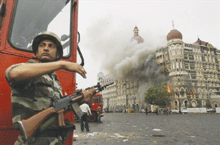One month after the maximum city of Mumbai (pop.14 million) was held hostage for almost 60 hours by ten terrorists who attacked a residential society, hospital, train station and two of the city’s most upscale hotels — atrocities which resulted in over 180 people killed and more than 300 injured — education institutes are wholly unprepared for emergencies. “In most schools, headmasters are not even aware of the exact location of the master electric switch. Only the security/ watchman knows where it is. If he is absent that day, a whole school could go up in flames,” says Suman Shinde education inspector of south Mumbai.
 But even if rather belatedly, such complacency is being shed in education institutions across India’s commercial capital. School and college managements are beginning to pay serious attention to disaster management training and providing better security to their students.
But even if rather belatedly, such complacency is being shed in education institutions across India’s commercial capital. School and college managements are beginning to pay serious attention to disaster management training and providing better security to their students.
Dr. Kishor Pillai, chairperson of the Maharashtra International Schools’ Association (MISA) and principal of the RIMS School and Junior College in a western suburb of the city, says that his institution has seriously tightened security on campus and in the school bus service. Moreover in his capacity as head of MISA, he has issued an advisory to 30 member schools across Maharashtra to follow suit. “We have installed a GPS system in our school buses to keep track of our students. Though this proposal was mooted much earlier than 26/11, we have now accelerated its implementation. We also plan to hold special safety and disaster management workshops with police and army support for our students and teachers on a regular basis. In addition, we will integrate post-trauma couns-elling sessions and disaster management into our curriculum,” says Pillai.
College managements in urbs prima indis have also awakened to the need to train students to confront terrorism. Ways to cope with terror attacks, assessing their impact on businesses and first responder training, which equips one to deal with emergencies, are now a part of the syllabus of the prestigious HR College in downtown Mumbai. In particular its undergrad business management, accounting and finance programmes have incorporated disaster management in their curriculums. “In the second semester, students study how organisations and individuals can cope with uncertainties and exigencies, and how terror attacks affect business. The first responders workshop will also be part of these programmes,” says Pratibha Pai, business management studies coordinator at HR College.
 “War is now in our streets. It’s essential that we equip our youth to combat crises. Hence, we’re making first responders training mandatory for all,” adds Indu Shahani, the high-profile principal of HR College and sheriff of Mumbai.
“War is now in our streets. It’s essential that we equip our youth to combat crises. Hence, we’re making first responders training mandatory for all,” adds Indu Shahani, the high-profile principal of HR College and sheriff of Mumbai.
Although hospitality management institutes in the city such as the Dadar Catering College and Rizvi College of Hotel Management & Catering Technology have yet to introduce disaster management in the curriculum, their counterparts in Chandigarh, which attract students from across north India, have finalised plans to introduce new programmes to equip their students to manage Taj and Oberoi-like 26/11 situations. The new study programmes, which will include rescue operations, fire drill and first aid techniques, will be introduced this year (2009). “We will give basic training to our students to confront terrorist attacks and other contingencies,’’ says Naveen Kumar Nanchahal, principal of Dr. Ambedkar Institute of Hotel Management, Chandigarh.
The positive outcome of the 26/11 man-made tragedy that claimed 180 lives, injured 300 and seared the psyche of Mumbai’s children and youth, is that it has brought into sharp relief, the hitherto neglected safety and disaster management issues in schools and colleges. That’s the silver lining of the terror cloud that exploded over Mumbai on 26/11.
Harshikaa Udasi (Mumbai)
Uniform squabbling
In high-end new genre international schools mushrooming all over the country, the trend is towards doing away with old-fashioned school uniforms widely regarded as a legacy of British imperialism. According to new age educationists and counsellors, permitting school children to wear clothes of their choice enables them to project their individuality and develop distinctive personalities.
But the majority of India’s poor and socially disadvantaged households highly value school uniforms — particularly uniforms given free of charge to children in government schools — because they obfuscate income disparities and save parents the expense of purchasing school-going apparel for their children. That’s why the six month delay of the Pune Municipal Corporation (PMC) in issuing uniforms to 61,414 boys and 62,125 girls who study in its 269 schools, has become a contentious issue. “It is more than six months since the academic year began, and there is no sign of the free uniforms that were promised to students. Very soon, it will be time for the final exams and the matter will be forgotten,” rues Pramod Lekre, father of 11-year-old Sunita who studies in a PMC school in Rasta Peth, a prime locality of Pune.
The cause of the inordinate delay in supplying two sets of uniforms promised per child, is that objections were raised by civic activists in June about the manner in which the tender for the purchase of uniforms was approved by the PMC’s school board. Following the report of an enquiry committee, in September 2008 the civic administration issued a show-cause notice to education officer Sudhakar Tambe of the PMC’s school board to explain the alleged irregularities. In the meanwhile the process of purchasing uniforms was stayed. Says PMC municipal commissioner Pravinsinh Pardeshi: “This was done because it was brought to our notice that there had been some indiscretion in the whole process including the tender procedure, product pricing and quality of the uniform fabric.”
Outraged by the allusions of corruption and favouritism made against the corporation’s school board, its chairman Mahesh Ladkat filed a petition in the Bombay high court praying for vacation of PMC’s stay order on issuing uniforms. “There was total transparency in the tender process. Also, I’ve had to take the matter to court because we are not sure who the higher authority is in this case, and whether the final decision is to be taken by the PMC commissioner Pravinsinh Pardeshi or the deputy director of education in the Maharashtra state government. We will now follow the high court’s verdict which is scheduled to be announced on January 6,” says Ladkat.
Meanwhile pune-based social activist Vijay Kumbhar of the Surajya Sangharsha Samiti insists that the tender process which rejected the bid of the state-owned Maharashtra State Powerloom Corporation (MSPC), is suspect. “We found many irregularities in the tender procedure. For example, there were no dates on documents. When we asked the school board for an answer, the members said that they had forgotten to mention the dates. We also wanted to know on what basis the school board had come to the conclusion that the record of the MSPC in providing uniform fabric had been sub-standard, and why the MPSC bid was rejected in favour of a private sector company,” queries Kumbhar.
Since then, an internal PMC enquiry has found the school board chief and several members guilty of not showing due diligence in conducting the tender process. Following this, the PMC cancelled the tenders for purchasing uniforms, shoes and socks, leaving students in the lurch.
And as the investigation process proceeds at snail pace, the 1.20 lakh students enrolled in Pune’s 269 PMC schools attend classes in rags, with many of them too embarrassed to come to school. But who worries about the orderly education of children of the poor and underprivileged?
Huned Contractor (Pune)